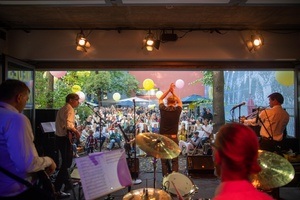PHOTO:
© Foto © 2012, Leo Seidel
Aida
In the organizer's words:
In Benedikt von Peter's production of Verdi's pharaonic opera, exotic Egypt is present only as a dream world on a postcard. In this reading, which occupies the entire auditorium, attention is focused on Radames' dichotomy between his sobering everyday life and his longing for a dream woman ... Conductor: Carlo Montanaro; Director: Benedikt von Peter; With Yulia Matochkina, Sondra Radvanovsky, Jorge Puerta and others."Amore, sommissione, dolcezza" - these are the attributes Giuseppe Verdi ascribed to his title character Aida: a woman who stands for pure love, docility and tenderness. Aida thus joins the ranks of those female artistic figures of the 19th century who were not so much real beings as objects of longing and projections of chauvinistic male dreams and who inevitably found their destiny in dying for love. This path is also marked out for Aida. But unlike in Verdi's previous operas, in AIDA there is an antithesis to doomed love: Amneris. Verdi characterizes her in his list of characters with "molto vivacità": Life pulsates in Amneris. Like a lioness she fights for her love, with her a solid relationship would be possible. Radames, however, the man between Aida and Amneris, cannot decide on a realistic life. He loses himself in fantasies of Aida, the "exotic", distant woman. Out of love for this female angel, Radames becomes a hero in his dreams in the fight against oppression and suffering, which, however, also exists in exotic, other worlds, i.e. far from his own reality. Before the eyes of the public, Radames stages his heroism and at the same time suffers from the failure of his own claim to be able to reconcile utopian love and political utopia. For his dream figure Aida is destined to die anyway, and the salvation of all prisoners and oppressed is both hopeless and in turn connected with violence. Thus, a hero far removed from reality, suffering from his own world-weariness, is at the center of an opera that is perhaps Giuseppe Verdi's most pessimistic. For it ends with the flight from the world and with the complete retreat into a stone mausoleum. In the end, Aida's death also stands for the death of utopia.
In this sense, director Benedikt von Peter understands Verdi's "Grand Opéra" AIDA as a "Requiem for Utopia", which is permanently followed by countless pairs of eyes of the public, and in his production occupies the entire auditorium of the Deutsche Oper Berlin. Benedikt von Peter has attracted attention with his directorial works and often unusual spatial solutions in recent years, including Verdi's I MASNADIERI at Oper Frankfurt, Handel's THESEUS, FIDELIO and IDOMENEO at Komische Oper Berlin, LES DIALOGUES DES CARMELITES and PARSIFAL at Theater Basel, and Luigi Nono's INTOLLERANZA 1960, LA TRAVIATA and DON GIOVANNI at Staatsoper Hannover. Benedikt von Peter has received several awards for his productions in recent years: For CHIEF JOSEPH at the Theater Heidelberg he received the Götz Friedrich Prize in 2007, for INTOLLERANZA 1960 in 2011 the German Theater Prize DER FAUST. 2012 - 2015 he was engaged as head director music theater in Bremen. In 2014 he was awarded the Kurt Hübner Prize for his productions at Theater Bremen (including AUFSTIEG UND FALL DER STADT MAHAGONNY, LA BOHEME, MAHLER III, MEISTERSINGER) as well as for the overall performance of the music theater division. This content has been machine translated.





